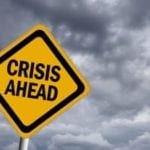Large companies often fail at crisis management because they view the situation only from their perspective. A more successful crisis-management effort considers the views of external stakeholders. In addition, several exercises can help communications teams boost speed and confidence during a crisis.
Crisis Management


Crisis Tips from Robert Kraft’s Non-Apology Apology
March 25th, 2019 by Seth ArensteinSometimes the most difficult parts of PR crisis management are the basics, when and if to react to something and what to say. The billionaire owner of the Super Bowl champion New England Patriots provides fresh evidence as he and his entourage mangle the sex scandal he’s battling. Was issuing an inauthentic apology the way to go?

PR Tips from Facebook’s Response to its Password Snafu
March 22nd, 2019 by Seth ArensteinConventional wisdom urges brands to own their mistakes and be as transparent as possible with your explanation of them. Another maxim is that when you don’t tell your story, someone else will gladly do it for you, though that version may differ greatly from your narrative. Facebook said it exposed millions of users’ passwords to thousands of its staff. It discovered the issue in January. Why did it wait until the end of March to mention it?

Amazon and Nike Forego Transparency: Was it the Right Call?
March 12th, 2019 by Seth ArensteinThe standard line today is that it’s best for brands to practice transparency as much as possible. Maybe, though, the largest brands can get away with not being transparent. Amazon made two significant policy changes in the first weeks of March and refused to say anything about them. Nike endured a few months of crisis prior to Colin Kaepernick with nary a public word. Was avoiding comment the right call?

Ethiopian Airlines Crash Reopens PR Issues from Lion Air Disaster
March 11th, 2019 by Seth ArensteinThe fatal crash of Ethiopian Airlines Flight 302 on March 10, 2019, re-opened PR issues surrounding a previous air disaster, the demise of a Lion Air flight in October 2018. Boeing’s 737 Max 8 was the aircraft in both crashes. Boeing denies a new flight control system in the Max 8 is to blame for the Lion Air crash. It also claims it communicated to airlines how to use the system. Some victims’ families deny Boeing’s claims.

What You Need to Know to Launch a Social Listening Campaign
March 4th, 2019 by Caitlin KellyDeveloping a social listening campaign is an important part of any communications strategy, as it can point to new trends as well as be invaluable as a crisis and issues management tool. But thanks to technology, it need not be difficult. Here are some tools communications professionals are using to ensure they know what is bubbling about their brands on social media.

To Engage or Not to Engage? When a Social Media Crisis Hits Your Brand
March 1st, 2019 by George HajSocial media can be a brand’s greatest friend or greatest foe in a crisis. Being honest, saying you’re sorry and responding to complaints with an authentic voice are keys to success, a panel of communications experts told the PR News Crisis Management Summit this week. Here are a few more things you should consider.

Takeaways from PRN-Crisp Survey, CSR Tips and New to the Resource Center
March 1st, 2019 by Seth ArensteinA roundup of takeaways from select articles in the current edition of PR News.

Botched Responses: Patriots Issue Quick Denial, Huawei Chooses Charm
March 1st, 2019 by Katie PaineVeteran PR guru Katie Paine looks at the crisis responses of the New England Patriots and the Chinese company Huawei. She gives neither one of them a passing grade.

PR News/Crisp Survey: 60 Percent Have Updated Crisis Plans, but Social Monitoring Shows Holes
March 1st, 2019 by Seth ArensteinA new study from PR News and Crisp, a social media issue detection and crisis monitoring firm, of more than 400 PR executives finds more than half of respondents saying their brands and organizations have current crisis plans. The downside is brands seem slow to react to a situation during off hours and communicators say they lack the resources to respond to a crisis.


